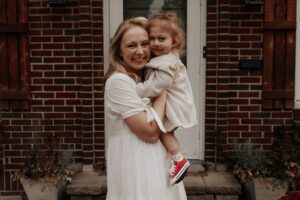I grieved the loss of normal parenthood. This was what I told people in the early days.
It served as a satisfactory answer to the question, “How are you?” If I answered well or good or okay, my friends and family didn’t believe me. Of course I wasn’t well or good or okay, but I didn’t have words for what I was experiencing. I started responding with, “I’m grieving the loss of normal parenthood.” People are empathetic to grief in the early stages.
In the beginning, in the months that followed the anatomy scan, I was expected to grieve, and, truthfully, I felt a loss. A loss of experiences I had deemed as normal, mostly described as small moments in the grand scheme of parenthood. July 4 was the day after our first maternal fetal medicine appointment. A Fourth of July parade passed by in front of our house. We went outside to watch with a group of friends. I watched the kids hold open their plastic grocery bags and look both ways before eagerly picking up all the pieces of candy in sight. I cried as I wondered if my child would be an eager participant in the candy frenzy. A few weeks later, I was out shopping and saw a little girl with her mom trying to choose a backpack for the upcoming school year. As I watched the little girl and her mom, I cried because I didn’t know if I would get this experience with my own little girl. I wondered if I would get to teach my child how to ride a bike or play catch in the front yard. I didn’t know if she would get to take swim lessons, ballet classes, or gymnastics. I wondered if kids would call her names or if she would get invited to classmates’ birthday parties. I felt these experiences as losses.
My girl lived. She beat the odds. A miracle. A blessing. According to the literature, if she survived birth, her life expectancy was six months or less. She lived past six months. She made it to one year. She made it to two years. We celebrated with birthday parties for each milestone. Eloise continues to write her own story every single day. Yet, I still find myself grieving the loss of normal parenthood. I no longer grieve the loss of experiences, but I grieve the mother I thought I would be. As Eloise continues to write her own story, I feel as though I’ve become an unrecognizable character in my own chapter on motherhood.
After Eloise’s birth, Zach went with her to the NICU, and my mom stayed with me in the mom and baby unit. I remember waiting for breakfast and telling my mom I would never have another baby. I had already changed back into the clothes I arrived in the night before, this time wearing a diaper under my sweatpants with a sweatshirt that said RELAX in big letters. My mom laughed at me, and I told her I was serious. She thought I was joking, but my feelings haven’t budged. It wasn’t the physical pain of an induced labor without an epidural that prompted my never-having-another-baby declaration. It was the emotional mind boggle of discussing Eloise’s death while she was fighting so hard to live.
I have always dreamed of having a big family. I wanted four kids and Zach wanted three. We thought we would live in Chicago someday. I thought I would be a working mom. We hired a nanny named Luann who would have been wonderful. I resigned from a job that I loved, and Luann never got to be Eloise’s nanny. My reality does not match my dream. I don’t mean dream as in some lofty far away fairytale. I mean dream as in the ability to look forward to something. As I survived, especially in Eloise’s first year of life, I lost my ability to dream. Zach made up a little jingle when Eloise was only a few months old. It went something like, “I’ve got my baby. I’ve got my wife. I’ve got my doggie, and that’s my life.” This jingle captured our life. We could not see beyond the present moment with each other.
Zach and I had a conversation at the beginning of this year – the kind of conversation you tiptoe around and hold your breath out of fear you’ll jinx it. We thought we were beginning to dream again. Looking forward. Moving forward. Eloise was admitted to the hospital within a few days after our chat. Our vision for the future was squashed as the tunnel vision set in. We couldn’t see beyond the four walls of Eloise’s hospital room. The wrestling between my reality and dream is immediately followed by guilt. Shouldn’t I get over myself? Didn’t I get the best case scenario? Why am I grieving? My girl lived. I should feel grateful. I should feel happy.
Anticipatory grief is an old friend. It was there from the moment we learned Eloise’s diagnosis. It still shows up but not as often. Or maybe the anticipatory grief is always there, and I’ve learned to live with it. It doesn’t wipe me out but instead exists as a constant voice in the back of my mind. Sometimes screaming. Sometimes whispering. Always there. I think grief is commonly associated with crying or anger or denial. Anticipatory grief is survival. It’s a way to recognize the here and now while swaddling up all of my emotions to exist under a name. A name to everything I can’t put into words. Sometimes numbing my emotions. Sometimes a comfort because it means Eloise is still alive.
The loss of normal parenthood has taken on different meanings over time. I no longer grieve experiences. I have sort of allowed myself to dream again. But the anticipatory grief lingers. And that’s okay.

